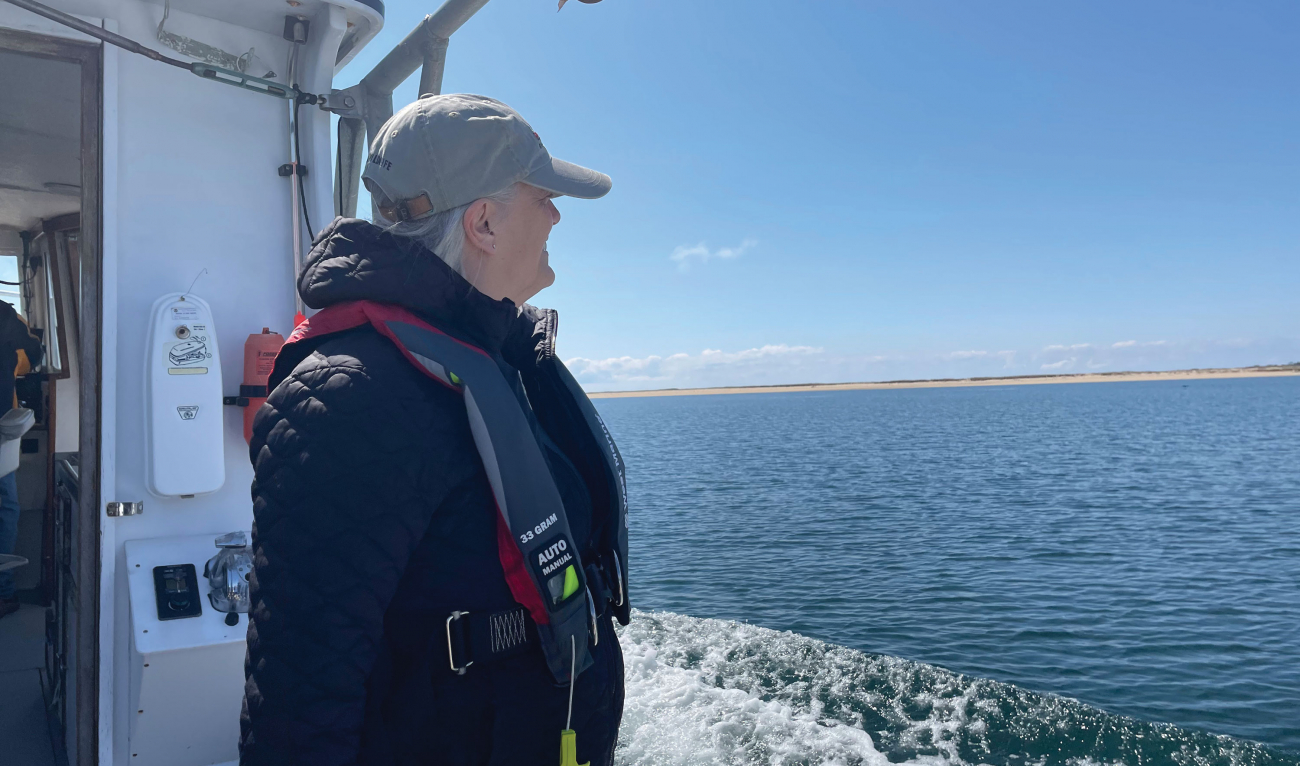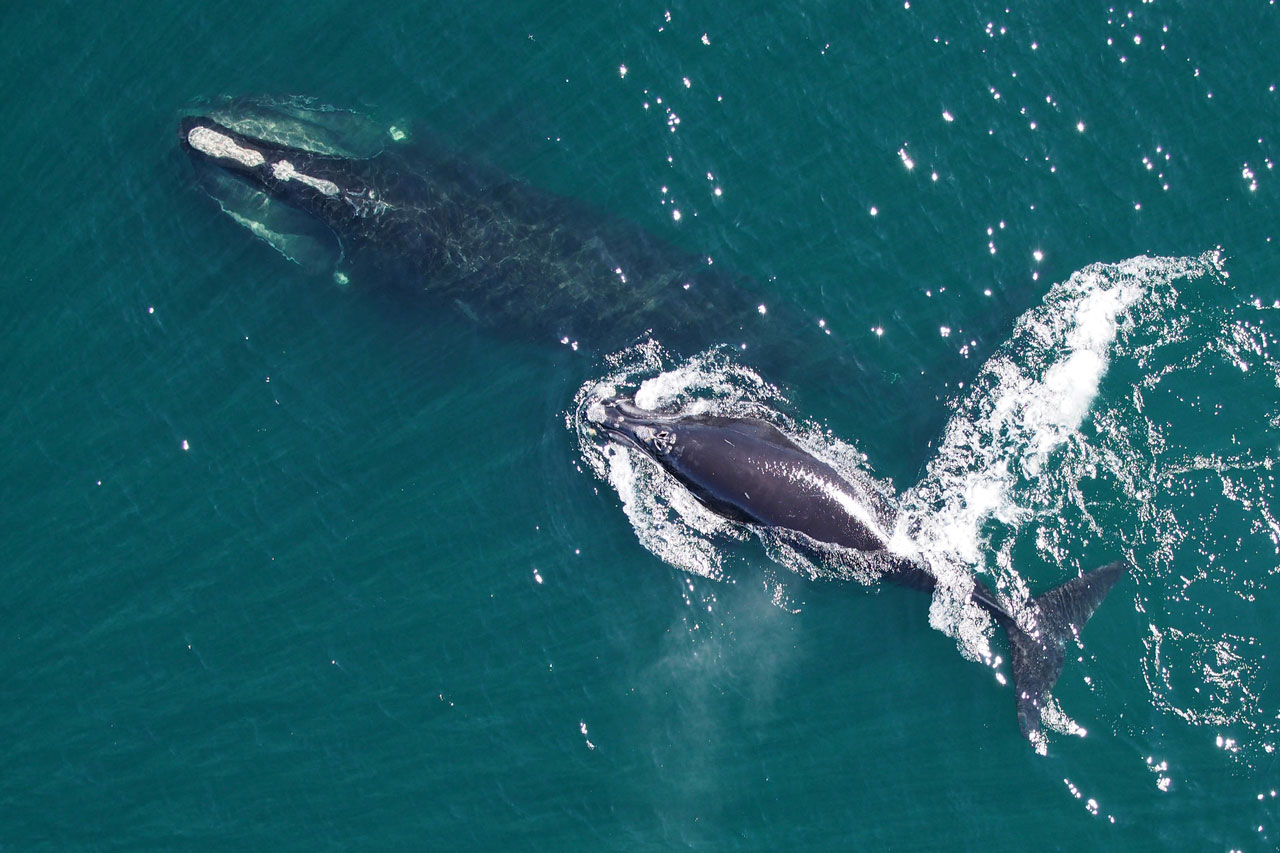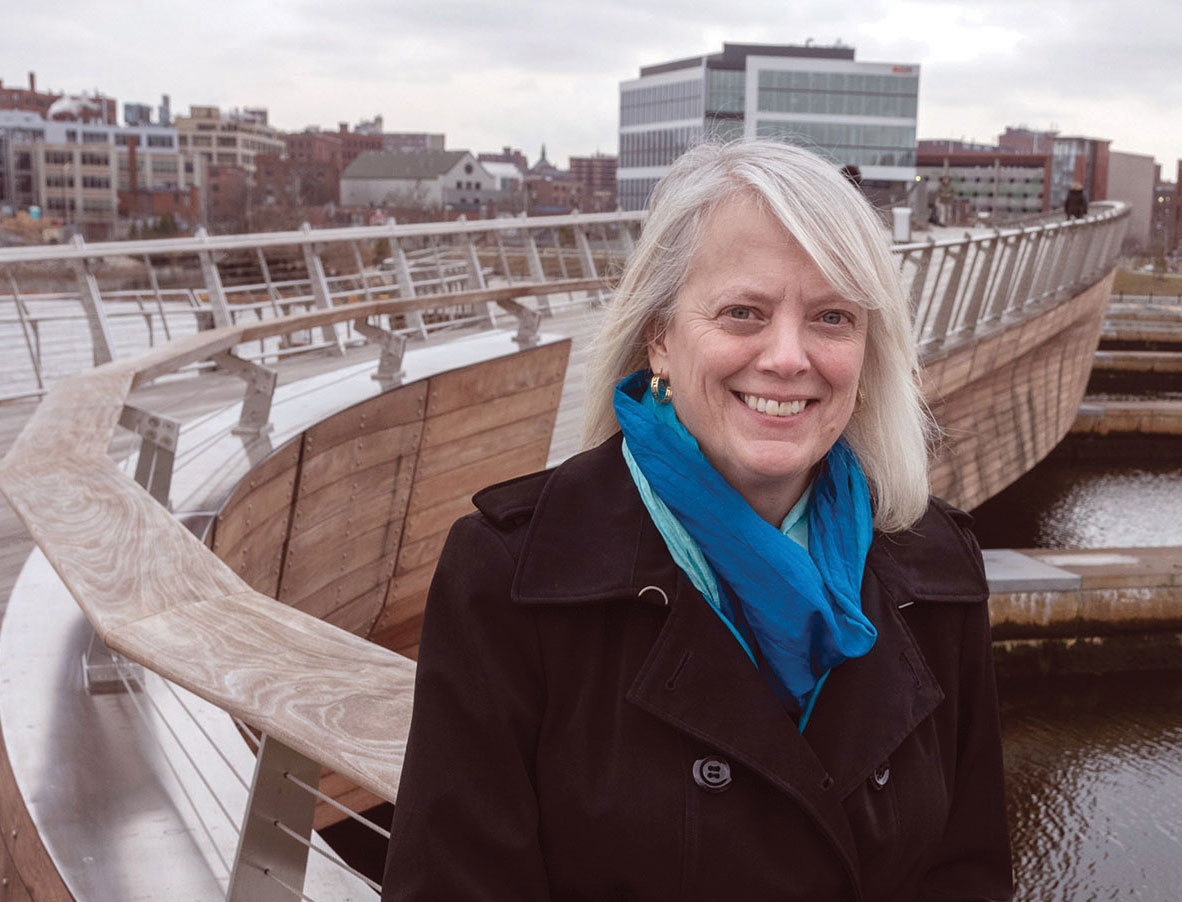Whale Watch
Janet Coit has seen a North Atlantic right whale only once, but that’s more than most people. It was in May 2023, nearly two years into her tenure as head of the National Oceanic and Atmospheric Administration’s National Marine Fisheries Service (NOAA Fisheries), and she was aboard a research boat in Cape Cod Bay. Scientists estimate that only 340 right whales survive today, so few that researchers have named each one. That day, Coit spotted 42-year-old Medusa—a female more than 50 feet long who weighs about 70 tons—swimming alongside her newborn calf.
Called “right” because they were favored by whalers who nearly hunted them to extinction for their oil in the 19th century, these whales have been on the endangered species list for decades. Today they are “critically endangered,” according to the International Union for Conservation of Nature. “These right whales are so rare that we cannot afford to lose even one of them if we are to prevent them from going extinct,” Coit explains.
Each spring, researchers anxiously look for right whale calves to gauge the health of the species, which is slow to reproduce. They recorded 11 calves born in 2023, fewer than in the previous two years. Seeing Medusa’s calf up close reminded Coit why she took the NOAA job. “Every day, I feel the weight of their fate on my shoulders,” she says.
A critical habitat for North Atlantic right whales overlaps with New England’s fishing grounds, where they’re struggling to thrive amid heavy human activity. “The leading causes of right whale mortality are entanglement in fishing gear and vessel strikes,” says Coit. “In addition, as a result of climate change, these whales are altering their migratory patterns and feeding areas, which is making them more vulnerable to vessel strikes here and in Canada.”
NOAA Fisheries oversees federal stewardship of all fish stocks in U.S. waters and enforces the Marine Mammal Protection Act and the Endangered Species Act in those same waters. These overlapping mandates mean Coit must try to save the North Atlantic right whale without harming New England’s lucrative recreational and commercial fishing industries.
Fishing lines have injured or killed at least 76 right whales in just the last six years. Often the whales get entangled in ropes that run from lobster traps on the seafloor up to buoys at the water’s surface. Coit’s office has been regulating lobster trap gear for years to try to make the waters safer for whales, but it’s beginning to look as though more drastic technological changes are necessary, such as on-demand lines that run to the surface only when a fisherman is present.
Growing concern for the plight of the whales poses an existential problem for the most valuable fishery in New England, the $600-million Maine lobster industry, because lobstermen are responsible for many of the fishing lines in the region’s waters. Whole Foods Market, with more than 500 stores in North America and the U.K., stopped selling Maine lobster in 2022, citing the whales, and the White House faced criticism for serving lobster that year. “If the Biden White House can prioritize purchasing 200 Maine lobsters for a fancy dinner, @POTUS should also take the time to meet with the Maine lobstermen his administration is currently regulating out of business,” tweeted one Maine congressman.
Biden may not have met with the lobstermen, but Coit has. Patrice McCarron, policy advisor and former executive director of the Maine Lobstermen’s Association (MLA), remembers their first encounter in July 2022. “I told her, ‘I’ve been with the MLA since 2000. And you are the first director of the National Marine Fisheries Service to ever come to Maine, on your own, to meet with fishery stakeholders.’ That was significant.”
According to McCarron, right whales are currently more concentrated in waters off Massachusetts and Canada, but Maine lobstermen are bearing the brunt of federal regulations. “It’s because we have more rope than anybody else,” she says.
“From the association’s perspective, what has troubled us the most is that in Maine, some of the measures are sort of theoretical,” McCarron adds, noting that the federal government shut down a 1,000-square-mile area of Maine lobster grounds to fishing for several months in 2022 to protect the right whales from entanglements without first surveying that area. “We’d like to know that we’ve actually saved some whales by taking our gear out of the water.”
Ship strikes kill more whales than entanglements in fishing gear. Data on both is incomplete, but scientists have confirmed 12 instances of right whales that became ocean roadkill between 2017 and 2023, compared to nine confirmed mortalities from entanglements. NOAA Fisheries’ multi-pronged action plan, “North Atlantic Right Whale Road to Recovery,” aims to reduce both collisions and entanglements. It also includes avenues to monitor and mitigate other potential threats, including ocean noise pollution and offshore wind development.
“The work we do touches communities in a really tangible way. The rules that we’re making affect real people. And you want to hear from them, respect them, and work with them.”
“Larger vessels are pretty used to being regulated, but smaller vessels are not as used to it, so there’s chafing about restrictions,” Coit acknowledges. “We need to reduce the speed of vessels of a certain size to reduce whale mortality.” NOAA Fisheries is also working with NASA and the private sector to explore new monitoring technology that would enable boats to detect and avoid whales.
“Congress gave $2.6 billion for NOAA,” says Coit, crediting the 2022 Bipartisan Infrastructure Law and the Inflation Reduction Act for the unprecedented funding levels. “We’re putting $82 million of that into right whales.”
NOAA Fisheries has distributed grant money to seed projects focused on developing affordable ropeless gear for the lobster industry. To reduce vessel strikes, Coit’s office is pushing a controversial new rule that would force more boats to slow down in right whale waters. But many boat owners, including charter fishing boat owners, say they can’t afford to operate under stricter speed limits.
Coit travels extensively to meet with stakeholders in these conflicts across all of America’s coastlines. “The work we do touches communities in a really tangible way. The rules that we’re making affect real people. And you want to hear from them, respect them, and work with them. That’s how I want to do this job,” she says.
“That’s one of her core strengths,” says Terry Gray, director of the Rhode Island Department of Environmental Management (DEM), a job Coit held for 10 years before moving to NOAA. Jason McNamee, another former DEM colleague who specializes in fisheries science, calls Coit’s ability to connect “her superpower.” Coit has managed to gain the trust of fishermen, despite their anger, McNamee says. “It’s the easiest thing in the world to say, ‘Hey, nope, the whales are in danger, so too bad. Pull your lobster traps out the water.’ That’s the simple way to go. But Janet is always looking for a way to strike a tradeoff, to protect the species and keep the industry going at the same time.”
An English major, Coit wrote her Dartmouth admissions essay about her love for the natural world, based in part on summers spent in the Adirondacks. She later studied environmental law at Stanford Law School and spent several years on Capitol Hill working for the late U.S. Sen. John Chafee. Coit considers Chafee, who championed the Endangered Species Act and sounded alarms on climate change as early as the 1980s, a personal hero. He often repeated Yogi Berra’s remark, “You can see a lot by looking.” That’s one of her favorite lines these days, too.
Like Chafee, Coit regards face-to-face meetings with communities as key to policymaking. In early September, she had just returned from a field trip to the Klamath River Basin in California and Oregon, where she met with local tribal leaders, farmers, and ranchers to discuss the impacts of removing dams that block salmon from their spawning habitat. A month earlier she visited American Samoa, and she was preparing for a week-long trip to Alaska, where she was slated to visit various NOAA offices throughout the state and join a citizens’ science event to count beluga whales in the Cook Inlet. She’s been to Maine three times since 2021.
“It’s hard to get to all the places I feel I need to be,” says Coit. She splits her time between Barrington, Rhode Island—where she and her husband, Peter Regan ’85, own a home—and Washington, D.C., where she has an apartment and divides her days between the U.S. Commerce Department downtown and NOAA Fisheries’ headquarters in Silver Spring, Maryland.
“It’s a time in my life when focusing on career feels really natural,” she adds, noting that her two children, Joseph Coit Regan ’19 and Nina, are in their 20s. “I have the energy to work a lot,” she says. “And I do feel optimistic that the things that we’re working on are going to give right whales a better chance to recover. That’s what motivates me.”













